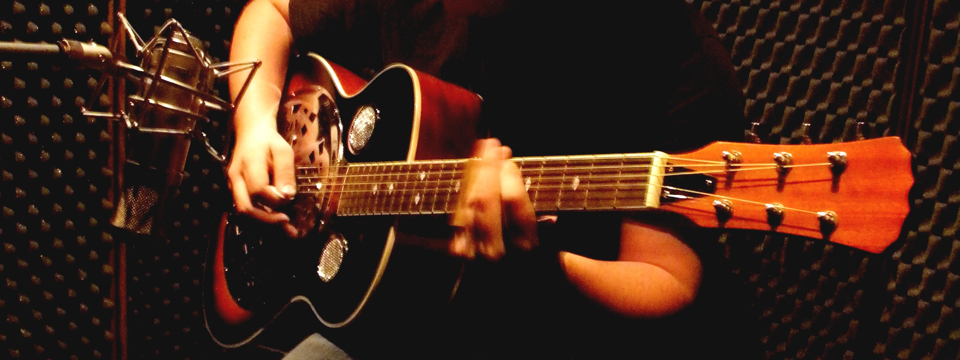
Modern Music 2
Modern Music 2
QR Link
Preparation
Transcript
Mike Berg: Ah! “Assaulted” is the right word actually I- I think you you nailed it'(to) nail it' is roughly equivalent to 'you hit the nail on the head' both of which mean, 'you did it exactly/perfectly' (0:41) right there. Assaulted is au- video and you know… Assault is the right word.
José: I I- I’ve always thought of it that way. You’re being almost attacked and almost in a sense that you want to be because that’s what you’ve gotten used to.
Mike: Mm. Yeah. And I think that what ends up happening is these videos just end up… having to- because we’re so bombarded with all this kind of visu- visual stimulus (mm-hmm) it’s like you have all these videos and artists end up having to compete for your attention, (mm-hmm) and they just have to get more and more (mm-hmm) glamorous and off the top. And it’s…I mean it’s it’s terrible for the listener because suddenly we’re just like woo-oo!'woo-oo!' Mike is imagining the sound of music fans demanding or yelling for what they want: attention-grabbing music (1:16) If it’s not- if it’s not huge and attention grabbing it’s like, it gets lost in the noise really, you know.
José: I get uh, this is part of uh, this song is presented to a lot of my students as part of a writing class and when they have a chance to write about it they say that “it makes me want to listen to more music like this” probably because it is something rare for a lot of them. Uh it it It’s rare to find a student who actually, or a young person even, who knows a lot about… Well maybe I’d- I’ve never talked to themaA lot about um, their tastes in Japanese music because I have no way to compare but I don’t think young people listen to music like this as much as they used to.
Mike: No, and that’s a shame actually, You know, because…
José: Kind of a shame, Yeah. Yeah yeah. Because like you I I love music that’s high-energy- super high-energy. Uh, when I run I listen to rock uh when I drive I listen to different kinds of music, but…
Mike: Yeah it’s… and you know I I personally I have uh uh an appreciation for anything acoustic like acoustic guitars and stuff to me are above and beyond'above and beyond' means at an extremely high level of quality.(2:13), I mean. I guess I guess in a way I respect it a little bit more than a lot of the music that comes out today that’s kind of just uh, made on a computer, you know someone hit play, took a sample and did something to it. (Yup) Produ- produced the crap out of it (Yup) and then it’s just- whereas this guy, you know spent five,10 maybe 15 years learning how to play this instrument just so that he could bring this to you. There’s a- there’s a certain amount of, or respect I have for that which I think is lost.
José: Oh it’s it’s- Uh, I completely agree with you. And it’s not only that he knows his technical craft. This song couldn’t be written by anyone who hasn’t lived the life and and had the experiences that let’s say a Jimmy Buffet'a Jimmy Buffet' placing 'a' before a (famous) name means 'for example, a person like'(2:55) or, you know just go back to the other side us of the spectrum, let’s say um, Eric Clapton. There’s a guy who’s lived an absolutely blues life (mm-hmm) and even though he’s he’s super produced. He’s produces himself, Phil Collins produced him. His producers are incredible. And he’s completely plugged in. He’s a rock god, as they say (Yup, yeah) there’s no way he could write the songs that he writes, without having lived… I mean, If- I I don’t think a lot of Japanese people know how crappy Eric Clapton’s life really was until he got straightened out, you know…
Mike: Huh! Yeah, yeah kind of like, or uh, Johnny Cash would be another one!
José: Oh Johnny Cash, yeah!
Mike: Right? Johnny Cash would kind of be the quintessential example really you know. Like… the guy’s had, the ups and downs and the drugs, and the you know, people dying on him and, and then you listen to his voice you know, and it just- it all kind of comes out and this… his voice reflects kind of all that pain and stuff he’s had over the years, right?
Consolidation
QR Link
Access this article on your mobile device

Modern Music 2
Speakers

José Domingo Cruz
Canadian
Vancouver, British Columbia

Michael Berg
Canadian
Saskatoon, Saskatchewan
Statistics
- words (including pause words)
- minutes in the mp3 audio
- words per minute for this article
Continue practicing your English fluency with the related posts above, or navigate to other authentic conversations using the Previous and Next buttons below.
Spritz
To spritz only part of this conversation, highlight the text you want and click the “SPRITZ NOW!” button. Clicking the button without any text highlighted will spritz the entire page.
To quickly adjust the words per minute (wpm), you can use the left and right arrow keys.
Writing comments will help your English writing skills. Feel free to ask questions and share opinions. We try to respond to all comments we get on the site. test




Speaking of modern music, in Japan, the vocaloid music genre dominated the world among the younger generation.
Vocaloid is a generic term for text-to-speech technology developed by Yamaha and its application products. By entering the melody and lyrics, you can make the synthesized voice sing. In Japan, MEIKO, KAITO, Hatsune Miku, Kagamion Lin, and Kanon Luka were released by Krypton Future Media. As a result, many Japanese began to post vocaloid songs on the Internet, mainly Nico Nico Douga. Especially, hatsune Miku’s popularity was terrible.
Vocaloid was not only a song, but also a genre of manga, anime, novels, games, etc. The Kagerou Project, a multimedia project based on vocaloid music, has a unique view of the world that has become particularly popular among junior high and high school students, and has become a kind of social phenomenon.
Vocaloids have become so popular that they are probably easy to get along with. It is likely to have been in the japanese who likes the cute character and the voice, and the ease that even an amateur can make and present music is a cute thing. In addition, because vocaloids are machines, some people sing at sounds and speeds that are impossible for humans, and some people interpret vocaloids as characters and apply them to stories to make songs. Many people did things that vocaloids had never been in their music before, and it was made up as new music.
Vocaloid is still popular as a musical genre, though not as much as it used to be.